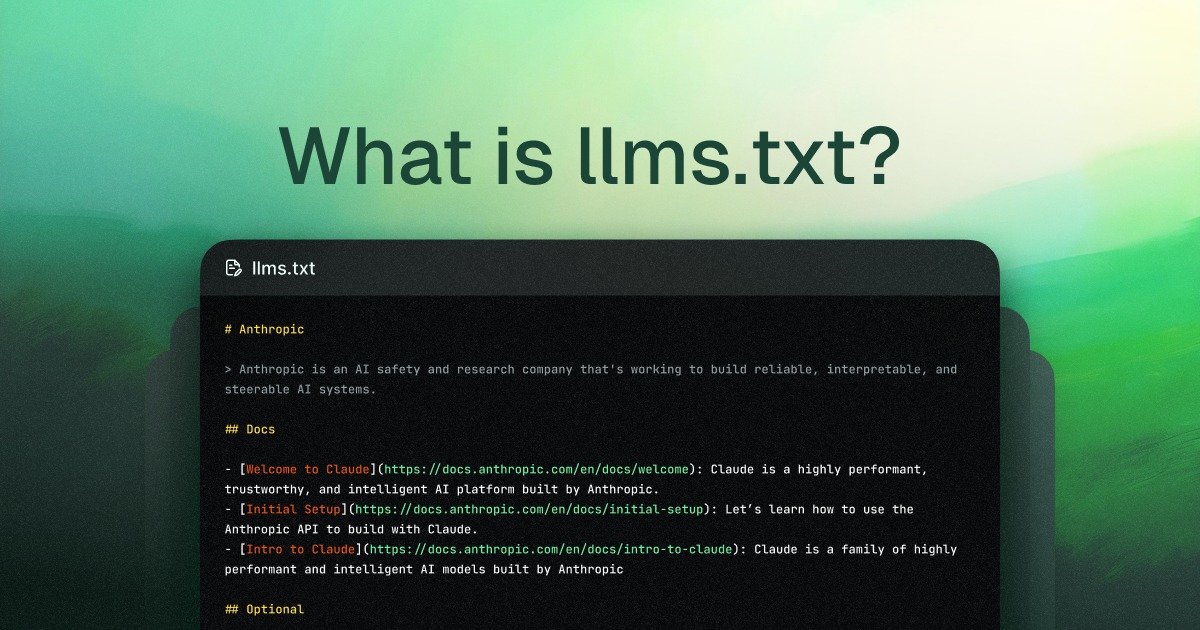LLMs.txt Explained: A Must-Have for SEOs in the Age of Generative AI
- Posted 2 weeks ago
As artificial intelligence continues to transform the digital landscape, traditional SEO practices are evolving to accommodate the rise of AI-driven search engines. One of the latest developments in this arena is the introduction of LLMs.txt—a proposed standard designed to guide large language models (LLMs) like ChatGPT, Claude, and Perplexity in understanding and utilizing website content effectively.
What is LLMs.txt?
LLMs.txt is a plain text or markdown file placed at the root of your website (e.g., https://yourdomain.com/llms.txt). Its primary purpose is to provide AI models with structured information about your site, facilitating better comprehension and interaction. This file serves as a bridge between your content and AI systems, ensuring that your website’s information is accurately represented in AI-generated responses.
Why LLMs.txt Matters for SEO
AI tools like ChatGPT, Gemini, Claude, and Perplexity are now acting as generative engines — answering user questions directly using data from websites like yours. If your content is powering these answers without attribution, links, or compensation, it’s time to act.
1. Enhancing AI Visibility
By implementing LLMs.txt, you can direct AI models to your most valuable content, increasing the likelihood that your site will be featured in AI-generated answers. This proactive approach ensures that your content is not only accessible but also prominently represented in AI-driven search results.
2. Protecting Content Integrity
LLMs.txt allows you to specify which parts of your website AI models can access and how they can use your content. This control helps prevent unauthorized scraping and ensures that your content is used in ways that align with your preferences.
3. Improving User Engagement
When AI models accurately represent your content, users receive more relevant and trustworthy information. This accuracy can lead to increased user engagement, as visitors are more likely to trust and interact with content that is consistently and accurately presented.
How SEOs Can Benefit from LLMs.txt
1. Preserve Backlinks and Brand Mentions
Many AI systems summarize your content without including backlinks. This strips away your link equity. LLMs.txt can help you preserve this crucial SEO asset by restricting unauthorized use.
2. Maintain Content Authority
Your content might be repurposed in ways that dilute your brand’s credibility. LLMs.txt reinforces your site’s authority by showing you’re aware of and in control of how your content is being used.
3. Avoid AI Content Cannibalization
Some AI tools pull answers directly from your site and present them without a click-through. While helpful to users, this creates a problem for publishers. By managing permissions via LLMs.txt, you can limit or negotiate how your content is used.
4. Enhance E-E-A-T and Transparency
Google’s E-E-A-T (Experience, Expertise, Authoritativeness, and Trust) guidelines reward transparency. LLMs.txt supports that by demonstrating your governance over data usage and openness to ethical AI practices.
5. Prepare for Generative Engine Optimization (GEO)
Generative search engines are the next frontier in SEO. Controlling your content’s appearance, use, and attribution in these tools is a new layer of optimization — and LLMs.txt is your entry point.
Real-World Use Cases
Case Study: WordLift
An SEO company, WordLift, implemented LLMs.txt to optimize their website for AI models. This strategic move resulted in a 25% increase in organic traffic, showcasing the potential of LLMs.txt to enhance SEO performance.
Case Study: Mintlify
Mintlify, a documentation platform, utilized LLMs.txt to simplify their content for AI models. This implementation led to a 40% reduction in parsing time and a 30% improvement in summary accuracy, demonstrating the efficiency gains achievable through LLMs.txt.
LLMs.txt vs Robots.txt: Key Differences
| Feature | Robots.txt | LLMs.txt |
| Target Audience | Search engine crawlers | AI models and LLM systems |
| Purpose | Indexing control | AI usage and licensing control |
| Format | Standard directives | Custom permissions, licenses, disclosures |
| SEO Relevance | Direct ranking impact | Content control, link equity, E-E-A-T |
How to Create and Implement LLMs.txt
Step 1: Draft Your LLMs.txt File
Begin by creating a plain text file named llms.txt. Structure the file to include:
- Contact Information: Provide a point of contact for AI models or organizations seeking to use your content.
- Permissions: Specify which AI models are allowed or denied access to your content.
- Licensing Terms: Outline any licensing terms or conditions for content usage.
- Disclosures: Indicate how your content is currently used by AI models, if applicable.
Here is our free one-click tool to auto-generate LLMs.txt and Markdown files based on your website’s preferences.
Step 2: Upload to Your Website’s Root Directory
Place the llms.txt file in the root directory of your website, ensuring it is accessible at https://yourdomain.com/llms.txt.
Step 3: Validate and Monitor
After uploading, validate the file’s accessibility and monitor its impact on AI-generated traffic and content usage.
Future-Proofing with LLMs.txt
As AI continues to play a significant role in search engine algorithms, implementing LLMs.txt positions your website to adapt to these changes proactively. By providing clear guidance to AI models, you ensure that your content remains relevant and accurately represented in the evolving digital landscape.
Conclusion
LLMs.txt represents a significant step forward in aligning SEO practices with the capabilities of AI-driven search engines. By adopting this standard, you not only protect your content but also enhance its visibility and accuracy in AI-generated responses. As the digital ecosystem continues to evolve, tools like LLMs.txt will be essential in maintaining a competitive edge.
Stay ahead of the curve with ImmortalSEO. Our upcoming tool will allow you to generate LLMs.txt files effortlessly, ensuring your website is optimized for the future of AI-driven search.
FAQs About LLMs.txt
Is LLMs.txt legally binding?
No, but it expresses intent and can serve as a basis for negotiations or legal recourse.
Do AI companies respect it?
Yes, OpenAI and others have confirmed they monitor content usage signals like LLMs.txt.
Will this impact my current SEO performance?
Not directly, but it ensures your SEO efforts aren’t undermined by unlicensed content reuse.
📌 Stay tuned: Soon you’ll be able to generate your own LLMs.txt file in seconds using ImmortalSEO’s free online tool.
Also Explore : How to Use On-Page SEO to Drive Free Traffic to Your Website

